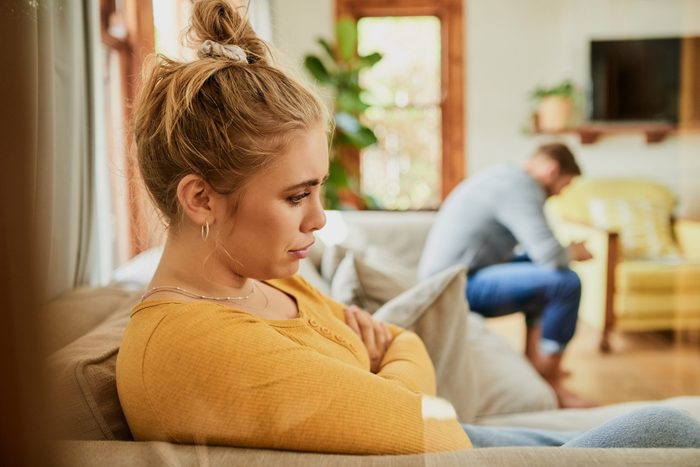7 Things Therapists Need You to Know About Relationship PTSD

Abusive relationships take a horrible toll, but the damage doesn't always end with the relationship.
Some people still associate PTSD with “shell shock,” a term coined after World War I for the potentially severe psychological effects seen in soldiers and others who experienced traumatic events. PTSD can be caused by many kinds of trauma, however, including trauma stemming from a relationship, says Silvia M. Dutchevici, a psychotherapist specializing in PTSD as well as president and founder of the Critical Therapy Center in New York City.
“You expect war to be traumatic and sad, but when you get into a relationship, you expect to be loved and not experience a frightening rollercoaster, with the person who is supposed to love and protect you inflicting the most pain upon you,” Dutchevici says.
Alisha Ali, PhD, an associate professor of applied psychology at New York University, agrees: “PTSD is defined based on having had a traumatic experience, and that can certainly include a traumatic relationship,” she says.
Some experts have even begun referring to the condition as post-traumatic relationship syndrome—PTRS.
(Related: 5 Relationship Deal Breakers That Suggest It’s Time to Move On)
What are the symptoms of relationship PTSD?
Because PTRS is related to PTSD, it can produce similar symptoms:
- recurring dreams
- flashbacks of traumatic events
- extreme psychological distress
- nightmares
- intrusive thoughts
- angry outbursts
Words, objects, or situations that remind the person of the triggering event might push the body into a fight or flight mode. With PTSD, this can lead to avoidance of anything that might remind them of the trauma. However, with PTRS, a person can end up dwelling on the events that led to trauma—and the trauma itself—potentially worsening the symptoms.
“We become hypervigilant or stuck in time, or have the compulsion to repeat the trauma so we can understand and control or change it,” Dutchevici says. “But in doing so, the result is always the same,” she adds.
Dissociation, the state of feeling like a guest in your own body, might also occur.
(Related: 9 New Books to Read to Ease Stress and Reset Your Mind)
Are some people more prone to relationship PTSD?
“Relationship PTSD could happen to anyone,” Dutchevici says. If you grew up in an abusive home, however, you may be more likely to end up in abusive relationships as an adult, she adds, due to poor modeling of healthy relationships in childhood.
Dr. Ali agrees, noting that people who have been in abusive relationships in the past often find themselves seeming to repeat the pattern. They may not have a tendency to seek out abuse, however, but simply lack the personal and social resources needed to escape traumatic situations. “They have been made to feel worthless,” Dr. Ali says, “or they have legitimate feelings of fear or uncertainty about their safety.”
How can relationship PTSD affect future relationships?
“Even if you find a nice person who is not abusive, your ability to be present, to trust, to have faith that this person will take care of you and not hurt you is greatly diminished,” Dutchevici says.
Love alone may not cure you. Research also suggests people with relationship PTSD often become codependent, aloof, judgmental, or abusive themselves in a relationship, and have difficulty coping with the challenges inherent to interpersonal relationships.
(Related: What Is a Toxic Relationship? What Therapists Need You to Know)
When should you seek help, and what kind?
“As with any problem, a person should seek help or make a change when they are having difficulty coping, when their ability to do things they want to do is compromised, or if they have persistent feelings of sadness, low self-worth, difficulty concentrating, and sleeping,” Dr. Ali says. The American Psychological Association recommends cognitive behavioral therapy as a means of combating PTSD.
Dutchevici believes individual therapy sessions make more sense than couples therapy, due to the risk of an abuser disliking something a partner says in therapy, then harming the person afterward. “It is also essential that the person learns not to rely on their partner for help,” she says. Antidepressants or anti-anxiety medications have been found to help alleviate PTSD symptoms in some cases.
Apart from therapy, lifestyle changes such as meditation, exercise, joining a support group, or opening up to loved ones can reap their own rewards.
(Related: 8 Women Share the Impact the Pandemic Has Had on Their Mental Health)
How can you reduce the risk of suffering relationship PTSD—or inflicting it?
Ideally, people learn the art of preventing bad relationships on the playground, more or less, Dutchevici says. “We have to teach children to respect boundaries early on, and that the basics of any kind of relationship are based on mutuality and respect,” she says. But you might also need to decondition yourself from ingrained Hollywood ideals of relationships.
“Romance movies tell you that you found this person who completes you, and everything’s perfect, and they insist on winning your heart because they know you better than you,” Dutchevici says. “A few years down the line, they might be the same controlling person that gives you PTSD because that person doesn’t respect your boundaries. Healthy relationships are based on two people who acknowledge and see and respect each other, and interact on the basis of mutuality.”
Resources
If you or a loved one needs help with an abusive relationship, you can seek help through these organizations:
Next, here are some expert tips on how to talk about the tough stuff in your relationship.




